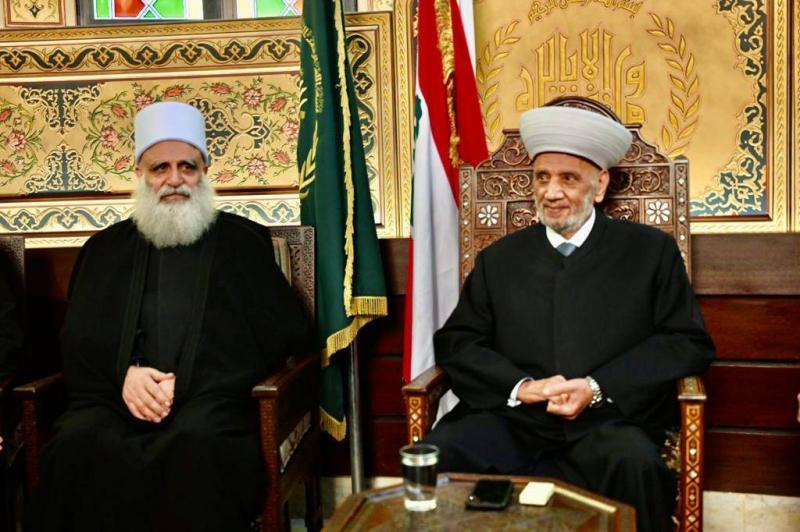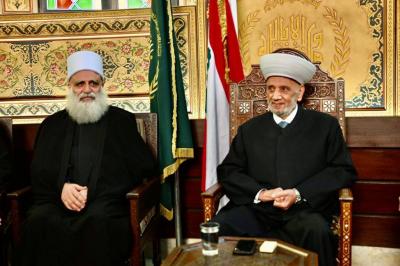The Grand Mufti of Lebanon, Sheikh Abd al-Latif Deryan, received the Sheikh Al-Aql of the Druze community, Sheikh Sami Abou Al-Muna, at Dar Al-Fatwa. The delegation included: President of the Supreme Druze Court, Judge Faisal Nasr al-Din, Judge Gandhi Makarem, Board Member of the Religious Council, Najy Saab, Board Member Sheikh Sami Abd al-Khalq, officials from the Religious Council and Sheikh Al-Aql, as well as advisors.
Following the meeting, Abou Al-Muna expressed that "the challenges are significant and require our effort and joint work to confront them. Today, we must choose: should we choose, as I told His Eminence the Mufti, dialogue or collapse? Should we choose dialogue or obstinacy and insistence? We advocate for dialogue, but we do not interfere in the form this dialogue takes or its framework; rather, we encourage dialogue and rapprochement because diverse Lebanon needs dialogue, and diversity in itself is a round table we should gather around."
He emphasized that "we must work together to fill the void, to overcome this unnatural state in Lebanon, to elect a president who bears responsibility, as stated in the Mufti's message on the occasion of the Prophet's Birth, which urged politicians to take on their responsibilities, at a time when people are suffering and hungry, demanding while politicians are arguing over this or that issue. There must be discussion, consultation, and dialogue at the state level. As for the spiritual authorities, there are challenges we must address regarding moral collapse and straying from moral and social values, which also urge us and call us to meet and to dialogue and hold higher-level meetings to counter these attacks."
He stressed, "We cling to spiritual values and uphold the education that preserves these values, for by preserving them, we safeguard society and the homeland. However, if morals and values collapse and deviation dominates the state, our fate is one of greater collapse. This is what we have confirmed, and what we always agree upon."
He stated, "Responsibilities are great, but the direction is clear from us, from His Eminence, and from all spiritual authorities to meet soon, very soon, to face these challenges with responsible and kind words stemming from the values of the religions to which we belong."
Regarding external initiatives, he said: "Lebanon needs external initiatives, and Lebanon is connected to the outside and needs support from abroad, but primarily it awaits internal understanding. If we wait for the outside while not taking any step internally, that would be a mistake, and the wait will be prolonged. However, if there are internal initiatives and internal rapprochement, this will facilitate the work of the outside."
He concluded: "Arab countries are concerned, and Lebanon is significant in its Arab depth, and it cannot be separated from this Arab depth. Just days ago, we were at the Saudi National Day celebration, and His Excellency the Ambassador confirmed the Kingdom of Saudi Arabia's concern for the Lebanese situation. We call upon them not to abandon Lebanon; Lebanon cannot be turned back on and left for the Lebanese to resolve their issues on their own, as they cannot amidst the many complexities in the region. Therefore, it is essential for Arab countries to assume responsibility, and we must take the initiative and pave the way for any intervention and assistance."
On another note, Deryan also received former Prime Minister Hassan Diab and discussed the general situation, as well as a delegation from Bekaa led by businessman Alaa Al-Din Al-Shamali, in addition to a delegation from the Arab clans headed by Sheikh Riad Al-Daher.




